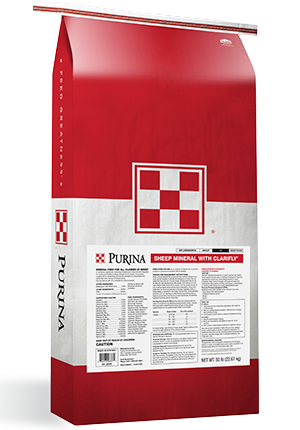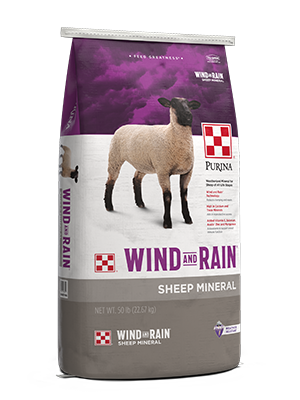
3 Tips to Boost Sheep Parasite Control
Wellness : Health
Wellness : Nutrition

There’s no question internal and external parasites bug your flock. Pun intended.
An effective parasite control program can go a long way to rid your flock of the discomfort and wasted energy caused by these pests. When sheep don’t have to worry about annoying flies and worms, energy can be diverted to more important areas, such as reproductive efficiency, weight gain and health.
When pest pressure increases, the stakes get higher.
Use these three recommendations to knock out parasites, boost animal productivity and benefit flock profitability:
These pests are of greatest concern from around March through October in southern states. Fly season in northern states depends on how soon temperatures warm in the spring and when killing frosts occur in the fall.
Fortunately, new control options, like Purina® Sheep Mineral with ClariFly® insect growth regulator provide an excellent way to help keep flies from nipping away profits. The product is designed for continuous free-choice feeding to sheep through the fly season to help prevent the emergence of house flies and stable flies from manure of treated sheep.
This mineral supplement with an insect growth regulator is a feed-through product and can be top-dressed with your flock’s daily ration. As it passes through the animal’s system, it’s incorporated into feces and stays in the manure pack. The active ingredient prevents fly larvae from eggs laid in manure from maturing. Purina® Sheep Mineral with ClariFly® breaks the life cycle, making it a great way to control flies.
The life cycle of flies is roughly 21 days. Be sure to add Purina® Sheep Mineral with ClariFly® to rations about a month before fly season begins to maximize protection.
This bloodsucking pest leaves animals weak, and even incapacitated – reducing weight gain, stressing general health and lowering reproductive performance.
Adult female worms produce eggs that are passed in manure. Larvae hatch and go through several stages of development before they can infect the next host. During the warm months of the year, enormous numbers of larvae can build up in your pasture.1
Consider these management actions to reduce barber pole worm challenges:
Work with your veterinarian to determine a comprehensive treatment plan to maximize worm control effectiveness.
Adequate dietary protein and minerals, such as that provided by Purina® Sheep Mineral with ClariFly®, as well as energy and other nutrients, are important when dealing with the effects of parasites. Nutrition gives animals the energy needed to address any disease challenges and support overall health.
Monitoring flock body condition score can help determine if parasite loads are a problem. If you know animals are receiving proper nutrition, but you notice body condition declines, or ewes and lambs aren’t as thrifty as they should be, consider parasites as a culprit and take corrective action.
Contact your local Purina nutritionist to learn more about parasite control for your flock.
Does your sheep nutrition program stack up? Find out with a Proof Pays trial.
An effective parasite control program can go a long way to rid your flock of the discomfort and wasted energy caused by these pests. When sheep don’t have to worry about annoying flies and worms, energy can be diverted to more important areas, such as reproductive efficiency, weight gain and health.
When pest pressure increases, the stakes get higher.
Use these three recommendations to knock out parasites, boost animal productivity and benefit flock profitability:
1. Give flies the buzz-off
No matter where you’re located, house flies and stable flies are a biting threat to your flock. Flies usually attack ears, noses, bellies, legs and open wounds or sores, and are known to carry and spread diseases.These pests are of greatest concern from around March through October in southern states. Fly season in northern states depends on how soon temperatures warm in the spring and when killing frosts occur in the fall.
Fortunately, new control options, like Purina® Sheep Mineral with ClariFly® insect growth regulator provide an excellent way to help keep flies from nipping away profits. The product is designed for continuous free-choice feeding to sheep through the fly season to help prevent the emergence of house flies and stable flies from manure of treated sheep.
This mineral supplement with an insect growth regulator is a feed-through product and can be top-dressed with your flock’s daily ration. As it passes through the animal’s system, it’s incorporated into feces and stays in the manure pack. The active ingredient prevents fly larvae from eggs laid in manure from maturing. Purina® Sheep Mineral with ClariFly® breaks the life cycle, making it a great way to control flies.
The life cycle of flies is roughly 21 days. Be sure to add Purina® Sheep Mineral with ClariFly® to rations about a month before fly season begins to maximize protection.
2. Banish barber pole worms
Although sheep are subject to many types of parasites, Haemonchus contortus, or barber pole worm, is considered the most significant nematode parasite.This bloodsucking pest leaves animals weak, and even incapacitated – reducing weight gain, stressing general health and lowering reproductive performance.
Adult female worms produce eggs that are passed in manure. Larvae hatch and go through several stages of development before they can infect the next host. During the warm months of the year, enormous numbers of larvae can build up in your pasture.1
Consider these management actions to reduce barber pole worm challenges:
- Rotate pastures. The longer native pastures can be rested, the better.
- Rotate dewormer products annually and follow label directions to minimize resistance issues.
- Work with your veterinarian to use fecal egg counts to determine treatment effectiveness.
Work with your veterinarian to determine a comprehensive treatment plan to maximize worm control effectiveness.
3. Use nutrition to boost sheep resilience
Animals on a high nutritional plane are equipped to address the adverse effects of parasites.Adequate dietary protein and minerals, such as that provided by Purina® Sheep Mineral with ClariFly®, as well as energy and other nutrients, are important when dealing with the effects of parasites. Nutrition gives animals the energy needed to address any disease challenges and support overall health.
Monitoring flock body condition score can help determine if parasite loads are a problem. If you know animals are receiving proper nutrition, but you notice body condition declines, or ewes and lambs aren’t as thrifty as they should be, consider parasites as a culprit and take corrective action.
Contact your local Purina nutritionist to learn more about parasite control for your flock.
Does your sheep nutrition program stack up? Find out with a Proof Pays trial.
1 University of Arkansas Cooperative Extension. Parasites in Small Ruminants. Available at: https://www.uaex.edu/farm-ranch/animals-forages/sheep-goats/internal-parasite-control.aspx.


